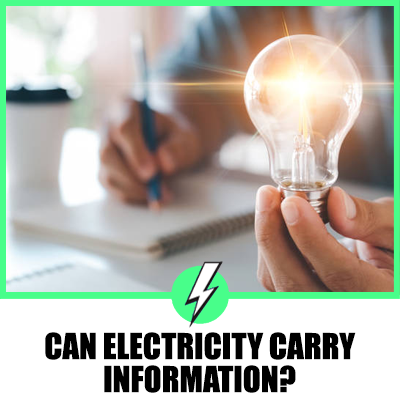Can Electricity Carry Information?
Electricity is a fundamental force of nature.
It’s a powerful medium for carrying information.
This article will explore how electricity carries information.
We’ll also look at how it can travel through you, how it can “grab” you, how a wire carries a signal, and whether electricity carries energy.

Contents
How Does Electricity Carry Information?
Electricity carries information through the manipulation of electric current or voltage.
This manipulation creates patterns that can be interpreted as information.
For example, in digital systems, a high voltage might represent a binary ‘1’ and a low voltage a binary ‘0’.
These binary digits, or bits, can be strung together to represent complex information, from the text of a book to a video on the internet.
In the world of telecommunications, this concept is applied in various ways.
For instance, in telephony, variations in current are used to represent the sounds captured by a microphone.
In digital communications, patterns of voltage or current changes represent binary data.
Can Electricity Travel Through You?
Yes, electricity can travel through you.
The human body is a good conductor of electricity, primarily due to the water content in our bodies.
Water is a good conductor of electricity, and since our bodies are made up of about 60% water, this makes us good conductors too.
However, this is generally dangerous and can result in severe injuries or even death.
It’s important to always be cautious when dealing with electricity.
Safety measures such as insulation, grounding, and circuit breakers are used to protect us from accidental electric shocks.
How Does Electricity Grab You?
When an electric current passes through a person, it can cause muscular contractions.
This is often described as electricity “grabbing” you because if you touch a live wire, the electrical current can cause your muscles to contract, making it feel as if you can’t let go.
This phenomenon is due to the effect of electricity on our nervous system.
Our nerves use electrical signals to communicate with our muscles.
When an external electric current is introduced, it can interfere with these signals, causing involuntary muscle contractions.
How Does a Wire Carry a Signal?
A wire carries an electrical signal by allowing an electric current to flow through it.
This current can be manipulated to represent information.
For example, in telegraph systems, specific patterns of electrical pulses were used to represent different letters of the alphabet.
In modern digital systems, a wire can carry complex signals representing a multitude of data types.
For instance, in a network cable, the signals can represent the binary data being transmitted between computers.
In a video cable, the signals can represent the images and sounds being sent to a television or monitor.
Does Electricity Carry Energy?
Yes, electricity does carry energy.
The movement of electric charges (current) through a conductor transfers energy from one point to another.
This is the principle behind electric power that we use to light our homes, power our appliances, and charge our phones.
The energy carried by electricity can be converted into various forms, including light, heat, and mechanical energy.
This is how light bulbs, heaters, and electric motors work.
They convert the electrical energy carried by the current into other forms of energy that we can use.
Insights from Online Discussions
Online discussions on platforms like Quora, Reddit, and Stack Exchange provide valuable insights into these topics.
For instance, a Quora discussion explains how electricity carries information in the form of binary signals.
A Reddit thread simplifies the concept of how light or electricity carries information.
An Electrical Engineering Stack Exchange post delves into the mechanics of how data travels inside a wire.
Lastly, a blog post discusses the potential of using light instead of electricity to carry information in computer circuits, leading to vast improvements in efficiency.
In conclusion, electricity not only powers our world but also serves as a vital medium for information transmission.
Its ability to represent complex information in a simple form of current or voltage changes has revolutionized our world, enabling technologies like telecommunication, computing, and the internet.
Understanding how electricity carries information can provide insights into how these technologies work and how they can be improved in the future.





